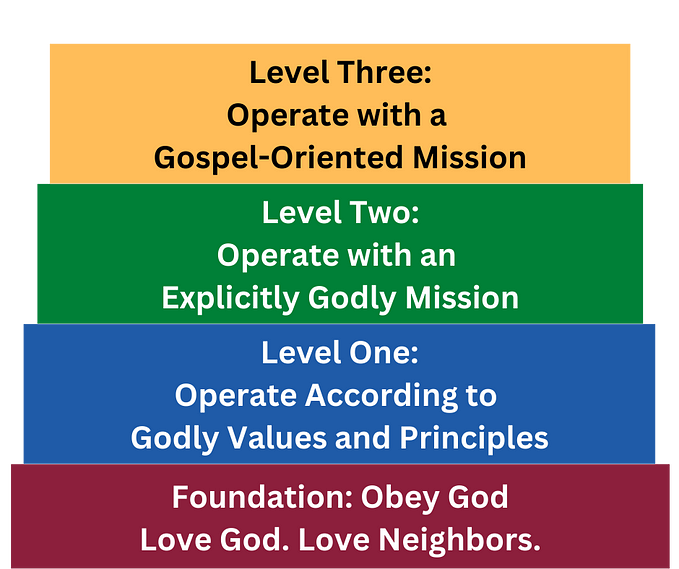Book Brief: The Redemptive Business
A Playbook for Leaders
Brief Summary
Title: The Redemptive Business: A Playbook for Leaders
Author: Dave Blanchard, Andy Crouch, and Scott Kauffmann
Published: 2021 by Praxis
What It Teaches: The word “praxis” means “Practical application or exercise of a branch of learning.” The authors of this book are leaders of Praxis, a “community dedicated to putting our Christian faith into practice through redemptive entrepreneurship.” The Redemptive Business is Praxis’ latest effort to teach Christian entrepreneurs how to practically put their faith into practice in their businesses.
This small book starts with a section on “First Principles” which introduces The Redemptive Frame combining the Three Ways to Work (exploitative, ethical, and redemptive) with the Three Dimensions of Work (strategy, operations, and leadership). That leads to six commitments of redemptive business: Product and Brand (Strategy); Culture, Business Model, and Partnerships (Operations); and Ambition (Leadership). The rest of the book teaches the reality, redemptive opportunities, and good news of each of those commitments.
When To Use It: The Redemptive Business is literally a small book (see photo below) and can be read cover to cover in about an hour. It’s also available for free on the Praxis website. I recommend that every Christian in business take the time to read it. You will be challenged to think differently about the role of business and the different disciplines within a business.

Brief Review
I continue to be very impressed with the Praxis team. When I first met Dave Blanchard five years ago, he struck me as smart, thoughtful, intentional, articulate and humble in applying Biblical principles to the practice of entrepreneurship. Since then, Dave has continued to surround himself with equally impressive collaborators, including his two co-authors of this small book.
And small it is. The picture above compares The Redemptive Business with From Concept to Scale, the first Praxis book (published in 2013). That picture doesn’t show its thickness, but at 84 pages, The Redemptive Business is a very quick read. Dave has a strong background in design and that shows in many of Praxis’ products. This book makes good use of color to lead the reader through the structure of the content. While there are only a couple of diagrams, they are effective, and attractively presented callouts draw attention to the most important principles. The authors have also pre-highlighted key sentences throughout, and the layout has generous line spacing and liberal use of white space, making it even easier for leaders to quickly benefit from the content.
My impression of Praxis is that they are very strong at two things. Their intelligence and thoughtfulness translate into deep thought-leadership in what “redemptive entrepreneurship” is. Their other strength lies in their community. They build deep and intentional relationships with current and future leaders. Within those relationships, they mentor and model to help these leaders make redemptive entrepreneurship real.
Perhaps surprisingly, what has been missing has been practical content (articles and books) for how to tangibly put that thought leadership into practice. The Redemptive Business is a clear attempt to fill that gap, and it’s a strong step in the right direction.
The book starts conceptually with a section on “First Principles”.
This section starts with a qualified defense of business and capitalism, perhaps best represented by two of its highlighted quotes: “capitalism, the markets that fund it, and the business practices based upon it, are both good and corruptible” and the “fundamental tension at the heart of capitalism — its proven power for social good entwined with its legacy of harm”. Redemptive entrepreneurs operate within this power and danger dynamic, accountable to God, and called to love our neighbors.
The bridge the authors introduce from this theological reality to practical application is what they call The Redemptive Frame. The Frame starts with “Three Ways to Work”:
- Exploitative: take all you can get with an “I win, you lose” mentality.
- Ethical: do no harm and seek “win-win” whenever possible.
- Redemptive: creative restoration through sacrifice with an “I sacrifice, we win” mindset.
The second dimension of The Redemptive Frame is “Three Dimensions of Work”:
- Strategy: what we build, which is defined by its cultural impact.
- Operations: how we build, which is defined by its impact on people.
- Leadership: why we build, which is defined by its success script.
With that framework, the authors define redemptive entrepreneurship as “building creative restoration through sacrifice into the world through our vocations and organizations.”
That leads into the second, more practical, section of the book: “Commitments of the Redemptive Business.” The authors identify six areas of business within the three dimensions of work. Within Strategy, they identify Product and Brand. Within Operations, they identify Culture, Business Model, and Partnerships. And within Leadership, they identify Ambition.
For each of these six areas there’s a chapter with four sections: Summary, Our Reality, Redemptive Opportunities, and The Good News.
The challenge is that there is no single answer for how to approach these six disciplines through a Biblically-informed, redemptive lens. Each company, at any moment in time, will face a different reality requiring a different approach. This challenge is relatively easy to deal with within community and intentional mentoring relationships, but not so easy when writing a book.
I appreciate how the authors have dealt with this challenge. Instead of laying out a step-by-step single answer, they acknowledge the complexity of the reality that leaders face and they identify relatively broad general opportunities for redeeming that reality.
To give a sense for what this looks like, let me share the summary statement for each of these six disciplines:
- “We develop products, services, and experiences that genuinely benefit our customers, their communities, and the world; and we thoughtfully minimize downside consequences. We avoid manipulative design or sales practices that profit the company but erode broader societal trust.”
- “We craft a brand through imagination and truth, advancing narratives of virtue and hope across our venture’s sphere of influence. We resist the urge to play to our customers’ desires, insecurity, or ego through marketing based on fear or status.”
- “We advance a team culture that helps people experience their work as neither ultimate nor transactional, but as purposeful and relational. We develop each person for and beyond their contribution to our mission instead of treating them merely as resources to advance the organization’s interests.”
- “Our business model optimizes for measurable value that is shared with customers and partners, not captured solely for the business and its owners. It takes into account social and environmental benefits and costs as well as the responsible management of financial capital and profit that is essential to a lasting business.”
- “We grow through partnerships of mutuality and integrity, avoiding a zero-sum view that only considers our own organizational priorities. We treat our investors, suppliers, distributors, and all partners as we would like to be treated, considering the needs, pressures, and health of their businesses and communities.”
- “We surrender our personal ambition to God and seek first the good of others, not ourselves. Instead of privately yielding our desires to an accumulation of wealth, power, and prestige, we cultivate gratitude, joy, and humility in the way we lead and serve.”
Bottom Line: The Redemptive Business does not provide simple answers, or step-by-step recipes for success as a redemptive entrepreneur, but does an excellent job of identifying practical and tactical ways in which leaders should reconsider how they operate their businesses. Given the minimal investment required in dollars and time, I strongly recommend that all Christians in business give this book a look.
You can read this book online for free, but if you want to buy a printed copy, would you consider buying it through my affiliate link at Amazon? Click here: The Redemptive Business (SDG Strategy will earn a small affiliate commission.)









